
Lab & Research
A flexible analytical technique, meeting needs as diverse as day in-day out routine analysis in contract laboratories and innovative research.
For contract labs, automated SIFT-MS delivers up to 25-fold throughput increases compared to conventional methods.
Plus get simplified, direct analysis of chromatographically challenging compounds (e.g. formaldehyde and hydrogen sulfide). For researchers, high sensitivity, high selectivity and very flexible sample delivery coupled with direct analysis are key benefits.
Sensitive, repeatable analysis of volatile compounds in air
Automation has been widely utilized by traditional chromatographic techniques for many years, enabling instrumentation to be productive 24/7 – a critical consideration when sample throughput is typically only 20 to 60 samples in 24 hours due to the slow analysis.
Further, chromatography itself can be a major limitation of traditional techniques because the breadth of analysis is constrained: multiple columns or several techniques may be required to comprehensively analyze one sample.
The advent of SIFT-MS – a cutting-edge analytical technique that comprehensively analyzes samples to parts-per-trillion (ppt) concentrations within seconds – redefines automation of volatile organic compound (VOC) and inorganic gas analysis. Rapid SIFT-MS analysis provides unique opportunities for high-throughput sample analysis, whether for routine VOCs, chromatographically challenging species (such as ammonia, formaldehyde, hydrogen chloride, and hydrogen sulfide) or any combination of these. SIFT-MS automation presents a major breakthrough in high-throughput headspace and gas analysis, with possible throughputs in excess of 100 samples per hour using sample bags.
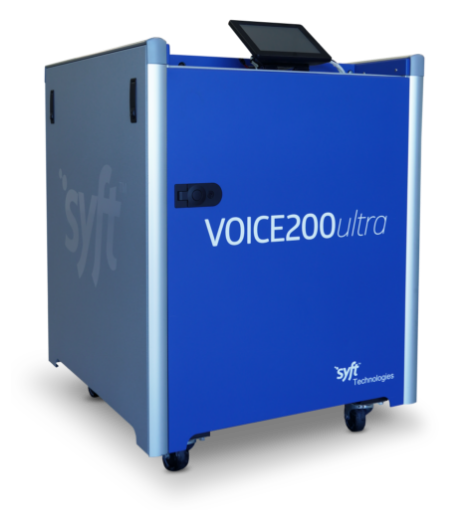
Learn more about SIFT-MS capabilities in Lab & Research
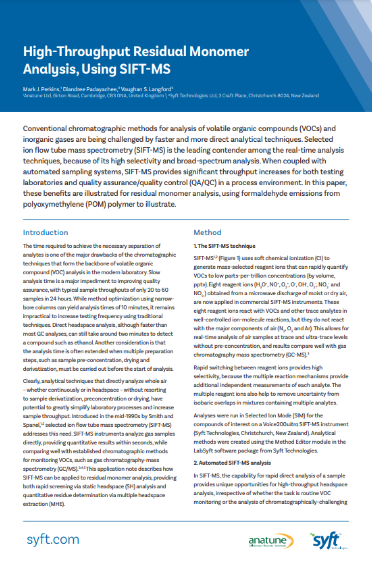
Residual Monomer Analysis
In this paper, the unique capabilities of SIFT-MS are illustrated for residual monomer analysis, using formaldehyde emissions from polyoxymethylene (POM) polymer to illustrate. SIFT-MS provides significant throughput increases for both testing laboratories and quality assurance/quality control (QA/QC) in a process environment.

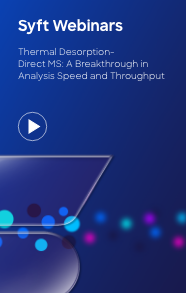
Thermal Desorption-Direct MS: A Breakthrough in Analysis Speed and Throughput
This webinar introduces SIFT-MS and explains the rationale behind seamlessly integrating thermal desorption (TD) with SIFT-MS. In short, the benefits of coupling TD and SIFT-MS are economic distributed sampling (such as for US EPA Method 325) and much higher throughput for an industry-standard sampling media.

Syft Tech Talks 1: A Semi-Technical Introduction to SIFT-MS
In this webinar, we cover:
- The chemical ionization used in SIFT-MS, and how it provides both selectivity and detection of chemically diverse compounds (including ammonia, formaldehyde, and hydrogen sulfide)
- SIFT-MS quantitation, which is based on ion-molecule reactions, conferring long-term measurement stability and library-based quantitation
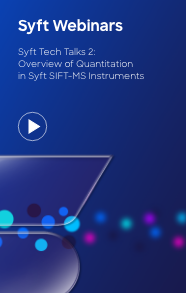
Syft Tech Talks 2: Overview of Quantitation in Syft SIFT-MS Instruments
Syft Technologies’ SIFT-MS instruments quantify volatile compounds in air or headspace in real time… but how do they do it? Vaughan Langford describes how quantitation direct from the SIFT-MS compound library is performed in Syft Technologies' instruments.
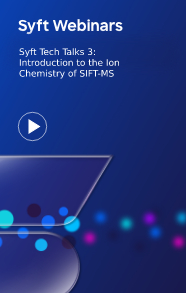
Syft Tech Talks 3: Introduction to the Ion Chemistry of SIFT-MS
In this Syft Tech Talk, Dr. Vaughan Langford introduces the ion-molecule chemistry utilized in SIFT-MS instrumentation. This highly controlled, ultra-soft chemical ionization approach enables SIFT-MS instruments to comprehensively analyze samples with high specificity in real-time.
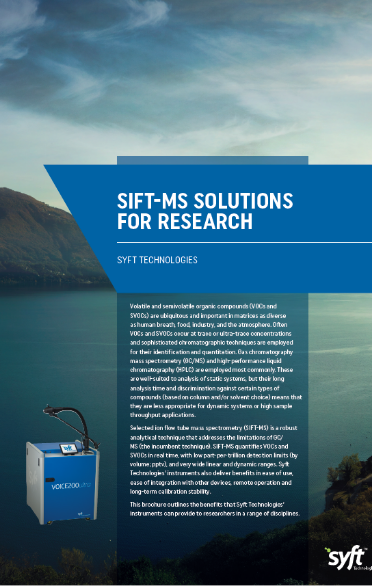
SIFT-MS Solutions For Research
SIFT-MS is a robust analytical technique that addresses the limitations of GC/MS (the incumbent technique). It quantifies VOCs and SVOCs in real-time, with low part-per-trillion detection limits (by volume; pptv), and very wide linear and dynamic ranges. This brochure outlines the benefits that Syft Technologies’ instruments can provide to researchers in a wide range of disciplines.

The SIFT-MS Automation Series: Episode 6 SIFT-MS Automation Past, Present and Future
In this sixth and final episode, Dr Perkins reflects on the automation journey and shares his practical "hot tips" for a wide variety of automated analyses. The webinar (and series!) concludes with a discussion of how automated SIFT-MS is an excellent complementary technique to the conventional laboratory "workhorse" techniques: gas and liquid chromatography.

The SIFT-MS Automation Series: Episode 5 Continuous Headspace Analysis… and Beyond and R&D laboratories.
In this fifth episode, Dr Perkins describes the novel continuous headspace analysis (CHA) technique that he developed to measure stripping of volatiles. (Note: CHA is not to be confused with dynamic headspace analysis!). In addition, Mark describes simple, very high-throughput gas sample bag analysis and touches on other recent developments – including thermal desorption-SIFT-MS.

The SIFT-MS Automation Series: Episode 4 Calibration Approaches for Automated SIFT-MS
In this fourth episode, Dr Perkins describes how simply and rapidly traditional instrument calibration is achieved with the automated SIFT-MS configuration. Traditional calibration approaches have not featured regularly in the SIFT-MS literature due to the widespread use of reliable library-based quantitation. However, calibration is essential for contract testing laboratories, so it is addressed in detail and from a number of different angles in this webinar.
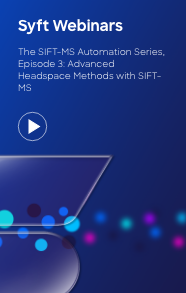
The SIFT-MS Automation Series, Episode 3: Advanced Headspace Methods with SIFT-MS
In this third episode, Dr Perkins describes the application of SIFT-MS to multiple headspace extraction (MHE). You will learn how to determine matrix-independent concentrations from MHE. Furthermore, Dr Perkins describes how the speed of SIFT-MS analysis can be leveraged to accelerate method development for both SIFT-MS and conventional methods – for example, through rapid determination of headspace equilibration times.
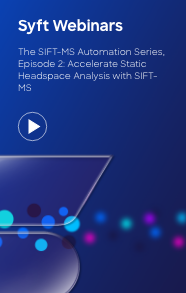
The SIFT-MS Automation Series, Episode 2: Accelerate Static Headspace Analysis with SIFT-MS
In this second episode, Dr Perkins provides a practical guide to automated static headspace (SH) analysis with SIFT-MS. You will learn how SH-SIFT-MS can address throughput challenges and simplify analysis of chromatographically challenging species.

The SIFT-MS Automation Series, Episode 1: Why Automate Analysis?
In this first episode, Dr Perkins answers the important question:
Why Automate Analysis?
This webinar introduces the benefits of automation and discusses how they can be applied to SIFT-MS, enabling straightforward adoption by the contract laboratory.
SIMPLE, RAPID ANALYSIS OF PACKAGING FOR VOLATILE MOSH AND MOAH CONTAMINANTS
Headspace-SIFT-MS can screen over 220 samples per day for volatile MOSH and MOAH compounds – nearly seven-fold more samples than the routine liquid and gas chromatography method.
A Sensory Expert Shares His Experience with SIFT-MS
We asked Mike McGinley, President, St. Croix Sensory, Inc. about his experience using SIFT-MS. Hear what he had to say about the speed of analysis and flexibility inherent to Syft's product solutions.
A Consumer Safety Expert Shares His Experience with SIFT-MS
We asked David Light, CEO and Founder of Valisure, about his experience using SIFT-MS and how it impacted their dry shampoo safety study.
High-Throughput Quantitative Analysis of Residual Monomer by Using MHE-SIFT-MS to Calibrate Single Headspace Injections
MHE-SIFT-MS provides rapid, matrix-independent, quantitative determination of volatile leachables in polymers and calibrates quantitative analysis based on single headspace injections. This approach enables over 200 samples per day to be analyzed, delivering rapid and economic analysis of volatile leachables such as residual monomers.
Syft Tracer: The Next Generation of Volatile Impurities Analysis for Enhanced Workflows
This app note introduces the next generation of SIFT-MS, Syft TracerTM, which launched at Pittcon 2023. It revolutionizes volatile impurities analysis workflows through unparalleled speed, performance stability, and reproducibility. Learn about how this innovation to real-time trace gas detection outpaces chromatography-based methods in the analysis of challenging analytes such as formaldehyde in a PEG excipient.
Recent developments and applications of selected ion flow tube mass spectrometry (SIFT‐MS)
SIFT‐MS is now recognized as the most versatile analytical technique for the identification and quantification of trace gases down to the parts‐per‐trillion by volume, pptv, range. This statement is supported by the wide reach of its applications, from real‐time analysis, obviating sample collection of very humid exhaled breath, to its adoption in industrial scenarios for air quality monitoring. This review touches on the recent extensions to the underpinning ion chemistry kinetics library and the alternative challenge of using nitrogen carrier gas instead of helium.
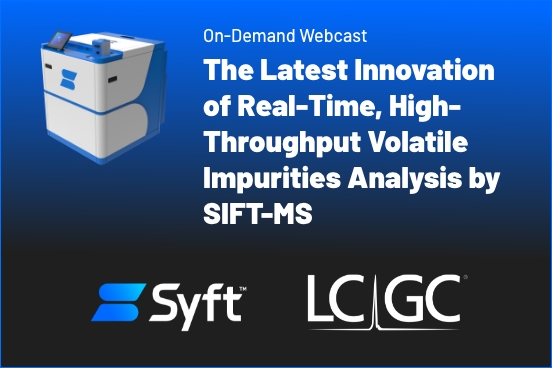
The Latest Innovation of Real-Time, High-Throughput Volatile Impurities Analysis by SIFT-MS
Join us for this webinar to learn about Syft Tracer, the latest advancement of real-time, trace gas analysis by SIFT-MS which launched at Pittcon 2023. Hear how the recent product innovations unlock analytical bottlenecks and enable faster decisions to be made in critical process steps.
Syft Tracer Brochure
Syft TracerTM is the latest advancement in real-time, direct injection mass spectrometry (MS) built to solve the most difficult analytical challenges faced within a variety of industries and applications. This advancement to SIFT-MS delivers trace-level detection sensitivity, unparalleled performance stability, superior selectivity, and highly reproducible, quantitative data. Syft Tracer is optimized for high-throughput environments where continuous operation is the standard. Never miss a product or environmental contamination event again.
Revolutionary Productivity For Volatile Residue and Impurity Analysis
This application note describes a scenario in which Syft TracerTM replaces five chromatography systems and still has significant available sample capacity. SIFT-MS provides rapid, chromatography-free analysis that revolutionizes multiple workflows.
Improved MHE-SIFT-MS Workflows - Concentration Independent MHE Calibration
This application note investigates concentration dependence of MHE calibration in sample matrix. Across the full range of analytes investigated in this study, MHE calibration holds for at least one order of magnitude change in sample concentration. For analytes in the C7–C9 range, the MHE calibration applies over two orders of magnitude analyte concentration. These results mean that the MHE workflow can be applied to a wider range of samples in the matrix, further reducing calibration demand.
Residual Solvent Analysis: Optimization for DMI Solvent
DMI is a very promising non-aqueous solvent because it can be used even without subsequent dilution in water. Using a subset of residual solvents, this study confirms that moderately polar volatiles yield headspace responses that are independent of the volume of sample used. This means that cost and environmental impact can be reduced. Furthermore, with SIFT-MS this optimization can be carried out very rapidly due to direct sample analysis and high sample throughput.
Volatile Compounds Quantitative Analysis Using Automated SIFT-MS with Multicomponent Gas Standard
This publication reviews best practices for quantitating volatile compounds in a wide range of applications using a multicomponent gas standard. Details of the approach to calculating concentrations from ion−molecule reaction kinetics based on reaction times and instrument calibration functions determined from known concentrations in the gas standard mix are discussed.